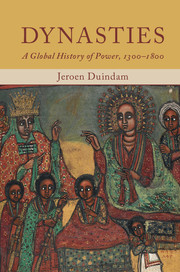Book contents
2 - Dynasty: reproduction and succession
Published online by Cambridge University Press: 05 October 2015
Summary
Prepare as you may against those who hate you, calamity will come to you from those you love.
Han Fei Tzu, ‘Precautions within the palace’, Basic Writings, trans. Burton Watson (New York, 1964), 86.He should guard against princes right from their birth. For princes devour their begetters.
‘Guarding against Princes', The Kautịlīya Arthaśāstra, ed. R.P. Kangle, 3 vols. (Bombay, 1960–5), II, 44.One obedient slave is better than three hundred sons; for the latter desire their father's death, the former his master's glory.
Anonymous poet quoted in Nizạ m al-Mulk, The Book of Government or Rules for Kings, ed. Hubert Darke (New York, 1960), chap. XXVII, 117.Descent and rivalry
Texts outlining the duties of rulership include women only marginally, yet the practice of dynastic power shows women in a variety of commanding positions. These same texts convey ideals of harmony, justice, and protection of the weak, while at the heart of dynastic power violent competition was endemic. This chapter on reproduction and succession redresses the balance by shifting attention to women and conflicts among royals.
Rights or expectations of succession engendered tensions between fathers and sons, between ruling kings and their brothers, and more generally among all scions of the dynasty eligible for the throne. At the same time, relatives held high positions at court and in the country at large, served as regional chiefs or governors, commanded armies, and on occasion replaced the king in ritual performances. Members of the dynastic clan were eager to protect the institution of kingship as well as the birthright of their family: these were emphatically shared interests. Kings who founded their authority on descent and royal blood needed to accommodate their siblings; only rarely did they relegate them without further ado to the margins of society. Once in open conflict, kings could not shed royal blood with impunity, but they found alternative ways to silence their proximate rivals. A potential for conflict was always present, particularly among the males at the heart of any dynasty. Dynastic power carried within itself a permanent invitation to violence.
- Type
- Chapter
- Information
- DynastiesA Global History of Power, 1300–1800, pp. 87 - 155Publisher: Cambridge University PressPrint publication year: 2015
- 2
- Cited by

